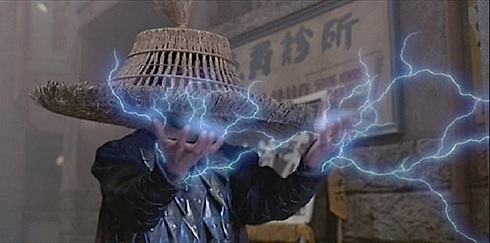This July marked the 25th anniversary of the release of Big Trouble In Little China, which has for every year it’s been on this earth been one of my very favorite movies. It’s endlessly quotable, features two terrific lead performances by Kurt Russell and Dennis Dun (more on this dynamic in a bit), and quite simply the dernier cri in film villainy: James Hong’s Lo Pan. It’s the most purely fun of any of director John Carpenter’s pictures—”purely fun” is not to be confused, in terms of objective quality, with “best,” by any means—has great music, is proof of how gorgeous Kim Cattrall was in the mid-80s, and in every imaginable way is as delightful as anything ever captured on celluloid.
Of course, it was a box-office flop.
It wasn’t my intent, with this loosely-defined rewatch series—of which Buckaroo Banzai was the first—to have them all be about cult classics or flops. It’s a coincidence that the first two pictures have been cult classics that lost money on their theatrical release, but the reasons why both pictures meet both those criteria are not. Aside from the bulk of Big Trouble In Little China‘s script having been written by Buckaroo Banzai director W.D. Richter, both pictures are gloriously, defiantly strange, have a certain charming, earnest visual cheesiness, and had the bad luck of being several years ahead of their time.
Big Trouble In Little China predated the increased interest in East Asian cinema in Hollywood by at least half a decade, and a lot of people didn’t quite know what to make of it. But, as Russell also notes with pleasure on that same commentary track, those of us who love this movie do so with great enthusiasm. I don’t know that I’ve ever popped in the tape (and later disc) of Big Trouble In Little China and not had a thoroughly enjoyable hour and forty minutes.
“When some wild-eyed, eight-foot-tall maniac grabs your neck, taps the back of your favorite head up against the barroom wall, looks you crooked in the eye and he asks you if ya ‘paid your dues,’ you just stare that big sucker right back in the eye, and you remember what ol’ Jack Burton always says at a time like that: ‘Have ya paid your dues, Jack?’ ‘Yessir, the check is in the mail.'” – Jack Burton
A pre-credit opening scene between Egg Shen (Victor Wong) and a lawyer (Deep Throat from The X-Files) and a series of monologues into a CB radio wherein Kurt Russell is “talkin’ to whoever’s listenin'” establish truck driver Jack Burton as a larger-than-life character, who talks like John Wayne and whose deeds are the last word in manhood. After his CB rant, he pulls into Chinatown and has a spirited game of Pai Gow with a bunch of other guys, one of whom is his old pal Wang Chi (Dennis Dun). Come dawn, Jack has everybody’s money, and Wang, in an attempt to win it all back, tries to cut a bottle in half with a knife, and fails. Wang tells Jack he can pay him back but first they have to go to the airport to meet his green-eyed fiancee Miao Yin.
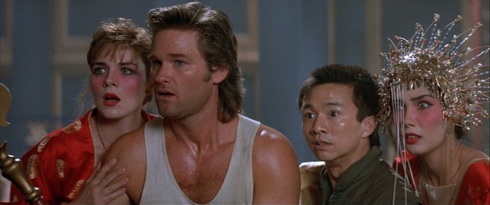
Jack, interested both in the novelty and the money Wang owes him, accompanies his old friend to the airport, where they meet another green-eyed beauty, white lawyer-activist Gracie Law (Kim Cattrall), to whom Jack is immediately drawn. As Jack flounders in his clumsy attempt to flirt, a street gang called the Lords of Death, looking to kidnap a girl to sell, abduct Miao Yin. Jack and Wang follow in hot pursuit.
In Chinatown, they end up in the middle of a war between two fighting tongs, the Wing Kong (for whom the Lords of Death freelance) and the Chang Sing (who, Wang informs Jack, are the good guys). One of the awesomest fights ever ensues, described by director Carpenter as “we have a huge gun fight… and then we get serious,” which means a whole lotta kung fu.
It’s already a great fight before three mysterious men (in very silly hats) arrive on the scene. They are the three Storms: Thunder (Carter Wong), Rain (Peter Kwong), and Lightning (James Pax). the first two represent their elements more metaphorically, but Lightning shoots actual bolts of electricity. The trio begin to utterly lay waste to the Chang Sing, before Wang yells at Jack to drive them the hell out of there. As Jack does so, the Storms step/fly aside, leaving one very tall, flamboyantly dressed tall man beckoning to Jack’s truck, daring him to drive straight through. Jack does, then gets out of his truck to see who this strange being was. Wang says “I think it was Lo Pan.” Jack goes, “Who?” With this, the tall gentleman walks slowly toward Jack and shoots light out of his eyes and mouth, temporarily blinding him. Yep, that’s Lo Pan.
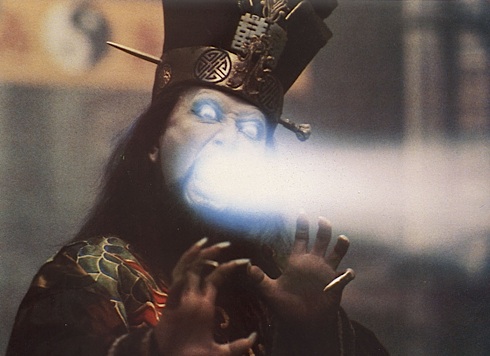
Back at Wang’s restaurant, Jack and Wang plot strategy with maitre d’ Eddie (Donald Li, who’s awesome), Uncle Chu (Chao Chi Li, likewise), and eccentric local bus driver/sorcerer Egg Shen (the greatest of all). They plot first to rescue Miao Yin from the brothel to whom the Lords of Death sold her, only to have the Storms blow the place up with green flame and kidnap Miao Yin. It’s at this point when it becomes clear that Lo Pan, needing a bride with green eyes to negate a curse put on him thousands of years ago, has taken Miao Yin to his unearthly subterranean lair. The rest of the movie? Go get her back.
Big Trouble In Little China never lets up for an instant. It’s filmed with John Carpenter’s customary flair, and edited crisply without ever seeming rushed (and seems positively sedate in that regard by modern standards). As much fun as all the action is—and that is massive fun—the movie’s strongest assets are its sense of humor and perspective. It’s a very funny movie, with terrific dialogue its cast delivers with relish, even (and especially) when it gets a little silly. Take, for example, the wit and wisdom of Mr. Jack Burton (and remember, please, to read these in the John Wayne tenor and cadence Russell does):
- “Feel pretty good. I’m not, uh, I’m not scared at all. I just feel kind of… feel kind of invincible.”
- (About Lo Pan): “Tall guy, weird clothes, first you see him, then you don’t?”
- “All I know is, this Lo Pan character comes out of thin air in the middle of a goddamn alley while his buddies are flying around on wires cutting everybody to shreds, and he just stands there waiting for me to drive my truck straight through him? With light coming out of his mouth?”
- (After having done so) “We really shook the pillars of heaven, didn’t we Wang?”
That last, leading into the clearest illustration of Big Trouble In Little China‘s self-awareness, speaks volumes about how they defeat and kill Lo Pan and his underlings. Note: “We.” While the movie starts out positioning Jack as the epic hero and Wang as the sidekick, as the movie goes on, Jack is revealed more and more as a motormouthed meathead, and Wang is the one with all the useful information, in whose milieu the action takes place, and who can kung fu a half dozen bad guys into unconsciousness while Jack runs out of bullets, drops his knife, and misses the whole battle. Let us not forget, either, the hilarious moment when Jack fires his gun into the ceiling and is knocked out by falling chunks of rock, missing the first part of the climactic battle. Or Gracie’s bright red lipstick on his face as he confronts Lo Pan for the final showdown.
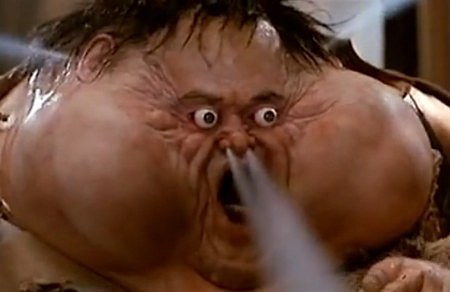
If Jack Burton had been a total clown, though, the picture would have been little better than it would if we were supposed to take him totally seriously. The thing is, Jack Burton makes mistakes, may indeed be the least smooth dude with the ladies who ever existed, and never shuts up. But he’s a good guy when all is said and done, his heart is in the right place, and he is the guy who kills Lo Pan, a very important entry in his resume. The critique of heroism Russell and Carpenter are engaged in is gentle, and both clearly have affection for Jack Burton, which lets the viewer share in that affection.
But yeah, heroes don’t come much cooler than Wang Chi. He, after all, is the one whose fiancee was kidnapped. He’s the one who needs to be there. And he’s awesome. Dennis Dun does an excellent job with the role, selling all his exposition about pseudo-ancient-Chinese mumbo-jumbo with great earnestness. Though, like with Jack, Wang would have been insufferable if he’d been perfect. The whole reason Jack doesn’t just drive away in his truck and say “see ya in a couple years” after the night of Pai Gow is because Wang gets all cocky and and bets Jack over a thousand bucks he can cut the bottle in half. And, as awesome as he is kung fu-ing all the bad guys and everything, he’s still kind of a dork, but therein lies his legacy: one of cinema’s great action hero nerds. Wang Chi, we salute you.
Every great hero needs a truly great villain. Lo Pan dwells in the upper echelons, with your Vaders and Voldemorts. He’s flamboyant, stylish, and just plain bad. James Hong cuts loose and gives easily the performance of his career, chewing scenery with wanton abandon, menacing both heroes’ respective love interests, not content with a mere one. He teeters on the brink of offensive caricature, and might seem like more of one were it not for strong characters on the good guys’ side like Wang and Eddie, and even Uncle Chu and Egg. Lo Pan ultimately is loathsome for the right reasons, not the wrong ones. Also, seriously. He’s Lo Pan.
Is Big Trouble In Little China a perfect movie? Define perfect. It is what it is, a funny, exciting tale of heroic deeds and epic villainy, perfectly. Does everything in it make sense? No, but that doesn’t matter. I’ve seen thousands of movies, I love movies themselves and everything about cinema more than just about anything, and if you told me I could only see one movie ever again, there is a very good chance it would be Big Trouble In Little China. “No horseshit, Wang?” “No horseshit, Jack.”
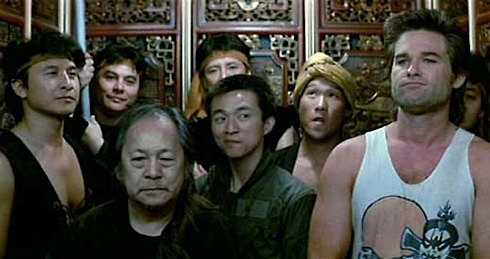
Danny Bowes is a playwright, filmmaker and blogger. He is also a contributor to nytheatre.com and Premiere.com.










